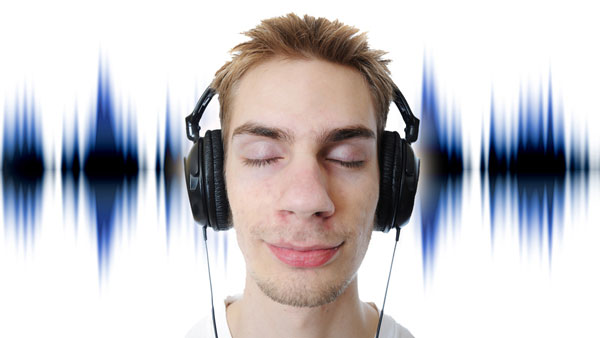It always happens to me, especially in the worst circumstances. I find these situations especially disturbing since I’ve talked about it with friends and considered how it impacts my life. I’m on the freeway with my stereo blasting, listening to an FM radio station blasting hard rock. I have my two hands on my steering wheel. I drive into a traffic jam. My anger level rises until I realize I’m listening to the wrong kind of music for my commute. Slowly coming to the understanding that my blood pressure is rising, and I’m about to make an inappropriate hand signal to a fellow motorist; I quickly change my music selection via a voice command through my phone connected to my GROM Audio car kit via Bluetooth and begin listening to some smooth jazz, reducing my blood pressure and encouraging a more positive attitude in myself.
Music has always affected me in this manner. It uplifts me, excites me, relaxes me, and much more. Music has and is a way for me to establish my mood and cue my attitude throughout the day. Many times it seems to me that the music I listen to is tapping into something deep and instinctual inside my mind and passing beyond into the primitive foundations of my soul. Music stirs the deep roots of my spirit and causes a tonal quake that reverberates deep from this central portion of myself all the way back to my most conscious being.
In her essay for PyschCentral.com, Malini Mohana describes this phenomena of music as “a type of perceptual illusion, much the same way in which a collage is perceived.” She explains that the brain creates a structure to understand the content of the music and develops meaning based on the nature of the sounds. The mind begins to predict how the music will continue and what emotional reaction should occur:
Music, though it appears to be similar to features of language, is more rooted in the primitive brain structures that are involved in motivation, reward and emotion. Whether it is the first familiar notes of The Beatles’ “Yellow Submarine,” or the beats preceding AC/DC’s “Back in Black,” the brain synchronizes neural oscillators with the pulse of the music (through cerebellum activation), and starts to predict when the next strong beat will occur. The response to ‘groove’ is mainly unconscious; it is processed first through the cerebellum and amygdala rather than the frontal lobes.
Music involves subtle violations of timing and, because we know through experience that music is not threatening, these violations are ultimately identified by the frontal lobes as a source of pleasure. The expectation builds anticipation, which, when met, results in the reward reaction.
I’m into many kinds of music but hard rock and metal are some of my favorites. I like the energy and excitation generated in me while I listen. I become motivated and immersed in the energy of the music’s tempo. Whether it is Metallica or Motorhead; I am alert, I am able to focus, and I’m emotionally volatile. The music gets me moving. It’s easier for me to get house chores finished and get me in the direction of the gym. I am physically amplified, along with vigorously engaged and involved.
The opposite can be said for slow and more melodic music. I use music to sleep at night. It drove my girlfriend crazy. Something about certain music distracts my mind and cues the right state of being for me to slip from consciousness and enter into a state of relaxed sleep. I listen to a lot of classical and ambient music before bed. I set the sleep timer to go off so my girlfriend, who goes to bed later than I do, isn’t disturbed by the music—she requires silence. Music by classical composers like JS Bach and Debussy set the right tone for sleep. Whether listening to melodic waves of “Air on the G String” by Bach or piano key strokes of “Clair de Lune” by Debussy, I am able to relinquish consciousness and become absorb in a state meditative sleep. Likewise, electronic phrases of Chris Russel’s Bloom album or Steven Brand’s Circular Scriptures album are able to help release tension and clear my mind. Feelings of respite and calm circulate throughout me.
In an essay written for The Synch Project, Marko Ahtisaari and Ketki Karanam wrote on relationship between music and emotion. One point they addressed in their essay was how music affects consumer purchasing behavior. They considered the possibility that though music may not dupe a person to buy something they don’t want, it may motivate them to consider something they would like to buy but are uncertain of acting on that desire. They cite a study of music played in a French restaurant to illustrate their point:
In a relatively unknown and somewhat concerning study for the free-willed person (5), playing characteristically French music in a wine shop increased sales for wines originating from France and or characteristically German music increased sales of wines from Germany. In another study (6), playing classical music versus pop music in a wine shop made people choose and purchase more expensive wines. Are people really this impressionable? Probably not. It is certain that hearing a certain type of music won’t make a person purchase something they absolutely do not want. This power that music can have in influencing our decisions may speak in part for the contextual nature of cognition. And the big role that music can have as part of your everyday life.
One way for me to make sense of this idea in my own life is to reflect back on how I use music to sleep. I listen to music that I find to be calming and relaxing. I’m in my bed with the lights off; my eyes are closed, and I am dug deep under the covers and into my mattress. I want to sleep and am looking for something to create and enhance this experience. I play classical music to entice me. It contributes to my state of being and helps me enter into a condition of deep restfulness.
Another example of how music influences my mood and behavior into states I both want and need is when I write. When I am writing I generally like to play music that is in tune with the topic or content that I am writing about. By creating a musical ambience—a sort of musical background—I am able to clearly illustrate and develop the mood and pacing of my composition.
I like to write fiction in my spare time. I write in a variety of genres and settings. I’ve written comedies, dramas, and many other kind of narratives. My stories have taken place in both the future, present, and past. One genre I have used whole or in part is horror. This genre requires a very specific mood and setting. If I am unable to create the right mood, the story fails to be effective from my point of view. This is why setting the right mood and tone is very important while I am in the process of drafting a story. I commonly use music to get me into the right mode of consciousness to begin drafting and revising. By playing moody, slow tempo atmospheric music I am able to write the type of material that creates tension and atmosphere for a horror story. The music I play becomes my personal soundtrack for my story, setting the tone for the events that occur and the behavior of the characters I create.
In many ways music may be perceived as an expression of emotion in itself. How many love ballads have been written over the last twenty years or more? How much heavy metal, rock, and rap songs have been composed expressing feelings of anger, frustration, and societal dissatisfaction?
Personally, I listen to many songs over the years just out of solidarity for my senses of loss or outrage. My breakups have been felt while listen to love songs and my anger has been mimicked in metal riffs. I have expressed my sorrow my creating playlist of Muddy Watters and Little Walter, as I have highlighted my rage with mixed tape collections of Anthrax and Slayer. I have encouraged the winter of lost love by seeking solace in Roy Orbison and Alicia Keys. I have reduced myself to meditative slumber with Schumann and Chopin.
In Matthew Kwong paper for Inquiries Journal, he explores the relation of music on the brain. He articulates earlier in the article how the brain has an immediate and dramatic effect when music is played:
The brain seems to have a natural reaction to music, causing listeners to tap their toes, sing aloud, and dance around. However “magical” it may seem, there are clear connections between music, the mind, and behavior. In fact, utilizing the latest in neuroimaging technology, researchers are able to observe how the brain processes auditory information when under the influences of music. Parts of the brain that show an increased activity include areas such as the hypothalamus, responsible for maintaining stress hormones, and the hippocampus, the area vital for emotion regulation (Levitin, 2006).
Like a flower blossom turning towards the sunlight, something in our minds turns towards music, reacts to it, and interprets it. I reacted both positively and negatively when suddenly hearing something for the first time; whether setting aside attention and focusing on what I hear, or covering my ears and walking away.
Getting back to my first example, I was driving into what I believed would be mild traffic. But that changed quickly. I found myself in a massive backup that would delay my arrival at work. Because I was playing loud, fast tempo music; my mood was further aggravated. The music began generating feelings and thoughts of outrage and exasperation, nearly causing me to offer a lude finger gesture to a fellow commuter. By turning off the music and focusing more on my driving, I was able to lower my blood pressure and focus on calm thoughts. By the time I got passed the main reason for the traffic jam, I had turn my stereo back on and played some Aretha Franklin. Her easy, slow tempo delivery helped make things easier for me to deal with and quickly I was able to get to work only ten minutes late and in a better mood.
As I get older music’s role in my life has changed. Less of my listening has been about having fun and more about focusing. Maybe this is simply because I have less free time and more work I need to complete. Time will only tell what emotions music will provide in me in the future, or how I will use it to inspire and enliven me.
About the Author:
Rudolfo San Miguel is an independent writer for GROM Audio. He works with several other companies creating compelling commercial content. He also writes fiction and poetry, He has published a book of poems titled “Cinders from the Bonfire.” He studied both creative writing and professional writing at San Francisco State University. You can see example of his professional portfolio at https://rudolfosanmiguel.contently.com





